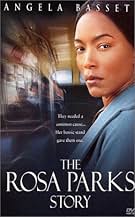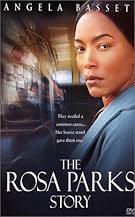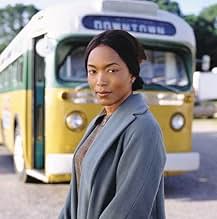AVALIAÇÃO DA IMDb
7,2/10
1,1 mil
SUA AVALIAÇÃO
Adicionar um enredo no seu idiomaA seamstress recalls events leading to her act of peaceful defiance that prompted the 1955 bus boycott in Montgomery, Alabama.A seamstress recalls events leading to her act of peaceful defiance that prompted the 1955 bus boycott in Montgomery, Alabama.A seamstress recalls events leading to her act of peaceful defiance that prompted the 1955 bus boycott in Montgomery, Alabama.
- Indicado para 1 Primetime Emmy
- 8 vitórias e 8 indicações no total
Dexter King
- Dr. Martin Luther King, Jr.
- (as Dexter Scott King)
Chardé Manzy
- Young Rosa
- (as Charde' Manzy)
Susan Savoie
- Virginia Foster Durr
- (as Susan Williams)
Enredo
Você sabia?
- CuriosidadesDexter King, the third-born child of Rev. Dr. Martin Luther King Jr. and Coretta Scott King, plays his own father in this movie. This is the second TV movie about the Civil Rights movement that depicts MLK and that has one of his children paying a role in it; the first was 1999's Selma, Lord, Selma, in which the Kings' first-born child, Yolanda King, played a small role (Martin Luther King was depicted in that film by Clifton Powell).
- Erros de gravaçãoContrary to the events portrayed in the film, in "Miles of Smiles, Years of Struggle" (1982), E.D. Nixon states the bus boycott was his idea and that of all the ministers he contacted for support, Martin Luther King was the only one who was reluctant to support a bus boycott. When Nixon called King back and pointed out that he would be the only minister not supporting the boycott and that a meeting about it would be held in his church, King finally agreed to support the boycott.
- Citações
Rosa Louise McCauley Parks: Why do you always push us around?
- ConexõesFeatured in The 54th Annual Primetime Emmy Awards (2002)
Avaliação em destaque
I didn't plan to write a comment at first, but when I saw one big mistake the director did, I was compelled to write one as soon as I finished watching. I am surprised that no one at that time said anything to the director. It was so obvious.
This scene was about Rosa Parks who had to walk several miles in the rain at night, after the bus driver threw her out of the bus. She walked into her home without the wet umbrella. She was wearing some fancy looking dry coat, and her hat looks dry. Her shoes look shiny with no water drop or mud on them. Her hair looked fine and dry. When she took off her coat, her clothes also looked dry. Most importantly, after she took off her "wet" coat, her husband just hung it on the coat hanger with all the other dry coats. There was no water drops on the floor, either.
The casting director did a good job by picking those few good white actors. I especially like the one who worked at the voter registration office, she really acted well, had that look. I also liked the one who worked at the white only library. However, the director failed to tell us what happened eventually when Rosa parks took a bunch of children to a while only library. We only saw them trying to check out books, but what happened afterward? Were they allowed to check out the books or not? This is a good real life story. If it was done well, it could have made the audiences to cry, but it failed to do so. The first half of the movie was well directed. After she refused to give up her seat on the bus, the story failed to focus the whole movement. It spent most time on her personal life. It should have showed us how her action led to the whole civil rights movement, what happened at the court, what other blacks did other than refusing to ride the bus. And what happened to NAACP, those people just seemed to disappear from her life entirely.
This scene was about Rosa Parks who had to walk several miles in the rain at night, after the bus driver threw her out of the bus. She walked into her home without the wet umbrella. She was wearing some fancy looking dry coat, and her hat looks dry. Her shoes look shiny with no water drop or mud on them. Her hair looked fine and dry. When she took off her coat, her clothes also looked dry. Most importantly, after she took off her "wet" coat, her husband just hung it on the coat hanger with all the other dry coats. There was no water drops on the floor, either.
The casting director did a good job by picking those few good white actors. I especially like the one who worked at the voter registration office, she really acted well, had that look. I also liked the one who worked at the white only library. However, the director failed to tell us what happened eventually when Rosa parks took a bunch of children to a while only library. We only saw them trying to check out books, but what happened afterward? Were they allowed to check out the books or not? This is a good real life story. If it was done well, it could have made the audiences to cry, but it failed to do so. The first half of the movie was well directed. After she refused to give up her seat on the bus, the story failed to focus the whole movement. It spent most time on her personal life. It should have showed us how her action led to the whole civil rights movement, what happened at the court, what other blacks did other than refusing to ride the bus. And what happened to NAACP, those people just seemed to disappear from her life entirely.
- Hunky Stud
- 12 de jul. de 2008
- Link permanente
Principais escolhas
Faça login para avaliar e ver a lista de recomendações personalizadas
Detalhes
- Data de lançamento
- País de origem
- Idioma
- Também conhecido como
- Ride to Freedom: The Rosa Parks Story
- Locações de filme
- Empresas de produção
- Consulte mais créditos da empresa na IMDbPro
Contribua para esta página
Sugerir uma alteração ou adicionar conteúdo ausente

Principal brecha
By what name was The Rosa Parks Story (2002) officially released in India in English?
Responda




























